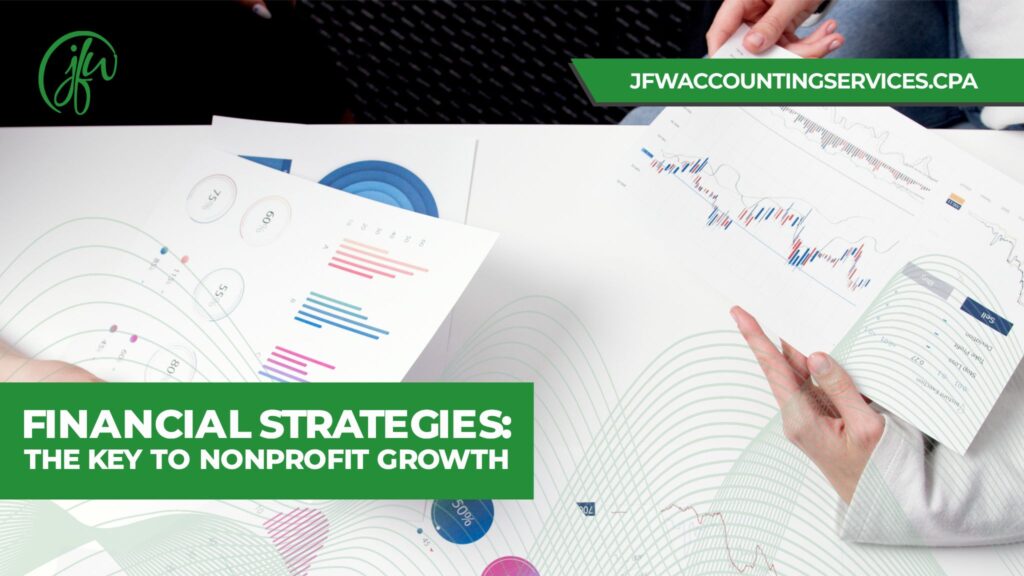As the leaders of nonprofit organizations navigate an increasingly complex world, they must understand that financial strategies play a critical role in their growth and success. In 2018, charitable giving in the United States totaled over $427 billion, reflecting the significant financial resources that flow into the sector (Giving USA, 2019).
But for so many nonprofits, the struggle to keep afloat is real. Operating on small budget margins with very minimal reserve, it can be a challenge to focus on their mission when their financial health is not stable (Nonprofit Finances Now).
How Can Financial Planning Benefit Nonprofits in Achieving Their Growth Objectives?
Financial planning can equip nonprofit organizations with the necessary resources and stability to fulfill their mission and better serve their target demographics. Through meticulous organization, nonprofits can effectively distribute resources, tackle funding obstacles, and make knowledgeable choices about their operations.
By putting into action solid financial planning, nonprofit organizations can guarantee that they possess the funds required to grow and develop while sustaining a robust financial stance that allows them to weather unpredictable periods and adjust to fluctuating conditions.
Financial Planning Approaches That Nonprofits Can Employ to Accomplish Their Goals

Budget Planning
Developing a budget is a vital instrument for nonprofits, as it aids them in preparing for upcoming expenditures, distributing resources, and tracking their financial well-being. By devising a comprehensive budget, organizations can pinpoint and prioritize their most significant objectives, making certain that they allocate funds efficiently and maximize their accessible resources.
Financial Projections
Projections involve estimating future income and expenses, allowing nonprofits to foresee their financial requirements and organize accordingly. This can assist nonprofits in avoiding potential cash flow complications and ensuring that they possess the necessary resources to realize their objectives.
Cash Flow Administration
Effective cash flow administration is crucial for nonprofits, as it assists them in maintaining sufficient liquidity and averting financial challenges. By meticulously observing cash inflows and outflows, nonprofits can maximize their funds’ usage, making certain that they have the cash on hand to address expenses and capitalize on growth prospects.
Reserves And Contingency Planning
Establishing financial reserves and creating contingency plans can help nonprofits weather unexpected challenges and maintain stability during difficult times. This can be especially important for organizations that rely on fluctuating funding sources or face a high level of uncertainty in their operations.
How Financial Planning Helps A Nonprofit Reach Its Desired Growth
Financial planning is an essential component of a nonprofit’s growth strategy, as it enables them to make informed decisions about their financial future. By engaging in regular financial planning, nonprofits can:
- Assess their current financial position and identify areas for improvement.
- Set realistic financial goals and objectives.
- Develop strategies for achieving their goals, such as identifying new funding sources or reducing expenses.
- Monitor their progress toward their financial goals and make adjustments as needed.
Best Practices For Financial Management For Nonprofits

Implement Strong Internal Controls
Nonprofits should have robust internal controls in place to prevent fraud and ensure the accuracy of their financial reporting.
Regularly Review Financial Statements
By reviewing their financial statements on a regular basis, nonprofits can identify trends, assess their financial health, and make informed decisions about their operations.
Transparency
Transparency in financial reporting is important in nonprofit organizations. Stakeholders are very keen on understanding your economic activities. Thus, they should always provide clear and accurate information in your reports.
Strategic Financial Planning
Having a strategic financial plan and regular assessment of that plan helps to ensure that organizations have the resources needed to achieve their goals and maintain financial stability.
Five Effective Fundraising Strategies
Nonprofits must find multiple funding streams. Incorporating a variety of funding sources such as grants, personal contributions, business partnerships, and revenue from goods or services is essential for nonprofit organizations.
It’s crucial for nonprofits to craft a persuasive argument for backing their cause. This should clearly communicate their purpose, showcase their achievements, and illustrate their importance to the community.
Building strong connections with contributors involves keeping them updated about the organization’s progress and results, as well as encouraging interaction with those who benefit from their support. Regular updates like monthly newsletters or informative reports can strengthen donor commitment and lead to increased contributions over time.
Taking advantage of digital platforms is also important. Broaden your audience and share information by utilizing social media. Publicize upcoming initiatives and invite the community to get involved. Furthermore, cultivating a culture of generosity within the organization is essential. Involve staff and board members, educate them on the significance of raising funds, and ensure they’re prepared to contribute to the organization’s objectives.
In Conclusion
Understanding the importance of financial strategies for nonprofit growth is vital. By implementing effective financial methods, engaging in regular financial planning, and adopting best practices in financial management and fundraising, nonprofits can ensure they have the necessary resources to grow and achieve their goals.
As the need for services provided by nonprofits continues to rise, it is essential for organizations to prioritize their financial stability and commit to strategies that enable them to meet the needs of the communities they serve.
– – –
Upgrade your accounting function today. Book a client assessment call with us and talk to one of our experts.

Jo-Anne Williams Barnes, is a Certified Public Accountant (CPA) and Chartered Global Management Accountant (CGMA) holding a Master’s of Science in Accounting (MSA) and a Master’s in Business Administration (MBA). Additionally, she holds a Bachelor of Science (BS) in Accounting from the University of Baltimore and is a seasoned accounting professional with several years of experience in the field of managing financial records for non-profits, small, medium, and large businesses. Jo-Anne is a certified Sage Intacct Accounting and Implementation Specialist, a certified QuickBooks ProAdvisor, an AICPA Not-for-Profit Certificate II holder, and Standard for Excellence Licensed Consultant. Additionally, Jo-Anne is a member of American Institute of Certified Public Accountant (AICPA), Maryland Association of Certified Public Accountants (MACPA), and Greater Washington Society of Certified Public Accountants (GWSCPA) where she continues to keep abreast on the latest industry trends and changes.

